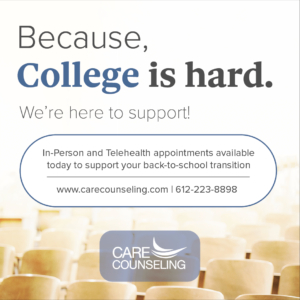Because, College is Hard!

The transition to college can be exciting, but also difficult. You may be leaving the comforts of home and sharing space with others for the first time while managing stressors associated with college life. Despite being surrounded by others, you may feel isolated and lonely. In addition to loneliness, common sources of stress include the following—
- Academic pressures, including internal pressure and familial or cultural expectations
- Relationships, including difficulties with intimate partners, roommates, or peers
- Experiencing harassment and discrimination
- Adjustment or social difficulties
Getting involved in clubs or other student activities is a great way to make new friends, increase connectedness, and try new things.
Reaching out to campus support such as workshops, peer support, and counseling services can offer support for mental health.
For students struggling with mental health, strategies that may sound easy for some students can take a lot of effort and become overwhelming or feel emotionally draining. Additional support may be needed to help ease the transition and develop skills in various settings.
Advocating for your academic, social, and mental health needs early can help facilitate a smoother transition to college life.
Did you know that 77% of college students experience psychological distress that is either moderate or severe? An American College Health Association (ACHA) 2022 study surveyed 54,000 undergraduate students of diverse identities who are opening up about their mental health experiences. You are not alone in your struggle and help is available.
Get familiar with your school’s resources, including career, health, and disability services.
It is important to take care of your mental health because college is hard! College is a common time for the onset of many mental health-related concerns and can exacerbate symptoms for those with underlying mental health conditions.
Outpatient therapy offers evidence-based treatment to support students all year. Consistent therapy services are necessary when moderate or more severe distress is present. In some situations, more intensive or specialized support may be recommended.
Therapists at CARE Counseling are here to support your transition back to school. We would love to partner with your school and be a part of your mental health well-being. Therapists are experienced in the concerns that impact college students and their families.
Here are some of the areas that can be addressed in therapy:
- Coping with adjustment difficulties and reducing symptoms associated with anxiety & depression, including safety planning for suicidal ideation
- Improving social difficulties, including autism/ neurodiverse students
- Developing strategies for improving general health and well-being to regulate mood and behaviors
- Exploring identity, including gender, sexuality, and intersectionality of identities
- Addressing substance use concerns
- Coping with grief, loss, and trauma
- Improving attention difficulties, including strategies for ADD/ ADHD
- Seeking support for disordered eating
- Treating obsessive-compulsive disorder
Check out this Mental Health Resource with information for young adults and their families on accessing crisis hotlines, emergency support, and mental health resources created by Newport Healthcare. https://149865200.v2.pressablecdn.com/wpcontent/uploads/2023/08/Mental_Health_Resources_YoungAdults.pdf
Check out additional information about CARE Counseling’s outpatient therapy services, including in-person and telehealth options here: https://care-clinics.com/
Written By: Charlotte Johnson, MA, LPCC
The information featured on this site is general in nature. The site provides health information designed to complement your personal health management. It does not provide medical advice or health services and is not meant to replace professional advice or imply coverage of specific clinical services or products. The inclusion of links to other websites does not imply any endorsement of the material on such websites.



























